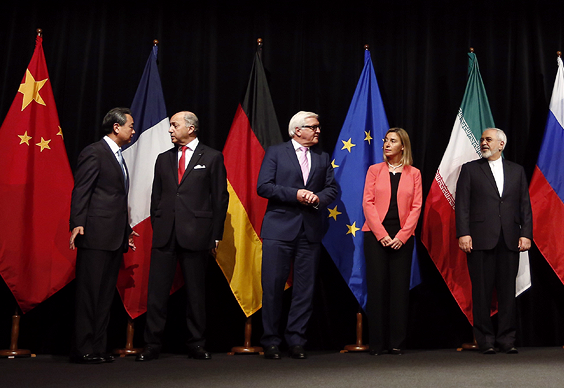February 19, 2021
Hanna Notte
The following was originally published at the Carnegie Moscow Center.
As was the case in 2006 and 2010, perceptions of Iranian intransigence in the face of constructive Western overtures—which may well be forthcoming under the Biden administration—could lead to a hardening of Russia’s stance, which is ultimately underpinned by concerns of nonproliferation and the integrity of the P5+1 process.
Almost one month into Joe Biden’s presidency, the new U.S. administration is yet to set out a road map for reviving diplomacy with Iran and returning to the 2015 nuclear deal (the Joint Comprehensive Plan of Action, or JCPOA). Tehran, meanwhile, appears committed to playing hardball and raising the stakes for Washington by gradually reducing some of its nuclear commitments.

Iran Talks in Vienna (2015), Source: WikiMedia Commons via Flickr, Gugganij
In November 2020, the Iranian parliament passed a law obliging the government to restore parts of the country’s nuclear program that had been halted under the terms of the JCPOA. In compliance with that law, the Iranian government has already installed more advanced centrifuges at the Natanz and Fordow facilities, resumed uranium enrichment to 20 percent purity, and started producing uranium metal.
A yet more controversial step could be in the offing, as the law requires the government to stop implementing the International Atomic Energy Agency (IAEA) Additional Protocol, which guarantees extensive verification mechanisms for Iran’s nuclear program. Tehran has threatened to suspend the protocol from February 21 unless the United States lifts nuclear-related sanctions.
Meanwhile, in unprecedented remarks, Iran’s intelligence minister, Mahmoud Alavi, warned on February 9 that Western pressure might eventually push Tehran to seek nuclear weapons, since “a cornered cat may behave differently from when the cat is free.” Tehran’s defiant stance has raised concerns not only in the West, but also among Russian officials.
Russia has backed Iran in the nuclear dispute since the Trump administration took the United States out of the JCPOA in May 2018. Then secretary of state Mike Pompeo’s efforts at garnering international support for an extension of the arms embargo against Iran were rebuffed by Russian diplomats, who derided the U.S. ploy as an attempt to “have its cake and eat it too.”
When the IAEA’s board of governors passed a resolution last summer calling on Tehran to grant the agency access to possible undeclared nuclear materials and activities from the pre-2003 period, Russia criticized the move as counterproductive. Moscow also repeatedly denounced the Trump administration’s “maximum pressure” campaign against Tehran as illegal and misguided, calling on other members of the P5+1 group of countries to ensure that Iran continues to benefit economically from the JCPOA.
That said, the Russian government has been historically consistent in contending that while Iran is entitled to use nuclear energy, IAEA oversight is required to ensure the peaceful nature of the Iranian program. Russian nonproliferation policies vis-à-vis Iran have occasionally clashed with Washington’s approach over the appropriate means—such as the suitability of sanctions to pressure Iran—but never over the desired end: that the Islamic Republic should not come into possession of a nuclear weapon. Iran’s recent escalatory steps and statements therefore pose a question regarding Russia’s red lines: How will Moscow react if Tehran takes its nuclear posturing one step too far?
History may offer some clues here.
Continue reading at the Carnegie Moscow Center.
